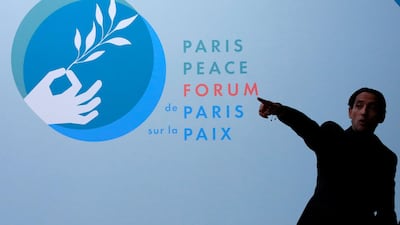As rounds of applause periodically erupted at the Paris Peace Forum on Tuesday, pitchmen for 121 selected projects set out their ideas ahead of a vote that will select the 10 most promising.
In the heart of the forum’s pavilion – an area known as the “Space for Solutions” – 34-year-old Ismail Abu Arafeh completed his 25-minute presentation on a project that aims to alleviate poverty in his native Jenin, a town perched in the hills of the Occupied Palestinian Territories.
IDEA, an incubator founded in 2015, was born from a partnership between two local organisations, Mr Abu Arafeh’s Palestinian Consultative Staff for Developing NGOs (PCS) and the Local and Economic Development Council.
“We want to prove that Palestinians are able to change their situation by themselves and resist the occupation,” he said in his pitch.
Since its launch, the incubator helped 45 start-up local businesses provide a lifeline for marginalised communities.
“In our semi-country, which has been under occupation for 70 years now, it is very difficult to build something meaningful,” Mr Abu Arafeh said. “We really are trying from bottom-up to give opportunities to people.”
The initiative has been instrumental in kick-starting the first pineapple farm in Jenin, an Arabesque wood design studio and a laboratory for carving quarry stones. These businesses in turn generate employment and contribute to giving back to IDEA and financing similar projects, which the incubator assists for an initial period of 6 months through feasibility assessments and training.
_______________
Read more:
Paris Peace Forum: UAE minister says artificial intelligence a 'black box'
Grassroots deradicalisation project allows youth to be part of the solution
_______________
Mr Abu Arafeh said participating in the Paris Peace Forum has been an opportunity to network and be inspired, but being in the winners’ roster would give IDEA the necessary boost to expand beyond the perimeter of Jenin.
“Our objective is to work across all 16 governorates in Palestine,” he said.
Following a call for applications that collected 900 entries from 116 countries, the Paris Peace Forum Selection Committee selected 121 projects to be showcased from 11 to 13 November 2018 as part of the forum’s first edition.
The forum offered them the opportunity to approach nearly 20,000 stakeholders from the worlds of politics, economics and academics attended the forum, and debate their global governance solutions.
A few stands from Mr Abu Arafeh’s initiative, Typhanie Scognamiglio, 35, distributed leaflets and gave out information on the Global Citizens Debate project, which seeks to “bring ordinary citizens into the global discussions on the pressing issues.”
“We want to reconnect citizens to the decision-making process,” Ms Scognamiglio, who works for Missions Publiques, one of the four independent organisations behind the project, said.
In 76 countries, 100 citizens representative of their population in age, gender socio-professional categories attended a day-long event on June 6, 2015, that sought to gauge their opinions on climate change.
This was the project’s first attempt to gauge the feelings of a representative portion of the population and produce data that could then be fed to governments and stakeholders.
“We are proposing a tool to improve democracy at a time in which democracy is under threat,” Ms Scognamiglio said, adding that Global Citizens Debate conducted another survey on driverless cars and is about to launch one on internet governance.
A number of high-tech projects also offered strikingly innovative solutions to the world’s most pressing problems. Nimray-Solar relies on the idea that blockchain technology can offer renewable energy to power the world while Embark is service connecting talented refugee with business leaders.
Meanwhile 3D Printed and Satellites, an initiative by the Peruvian organisation Ankawa Internacional, aims to provide 3D printed satellites to marginalised communities to monitor water, air and ground pollution, record aeral images or improve internet connectivity through the satellite technology.
“According to the distance on earth we can take different information from the ground,” Amilcar Romero, the 32-year-old founder of the initiative, told The National.
While satellites are not new, Mr Romero said that 3D printing has made the technology “cheaper and transferrable to the people who need it the most.”
“We realised that local [marginalised] actors did not have any information on what is going on in their territory,” he said.
The 3D Printed and Satellites product is now about to be launched in Syria, it will be used to collect data on the situation in the war-torn country to facilitate humanitarian intervention on the ground.

